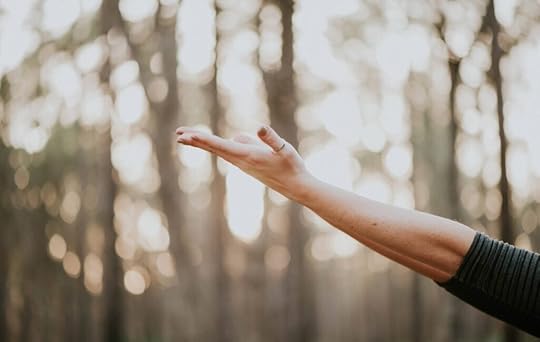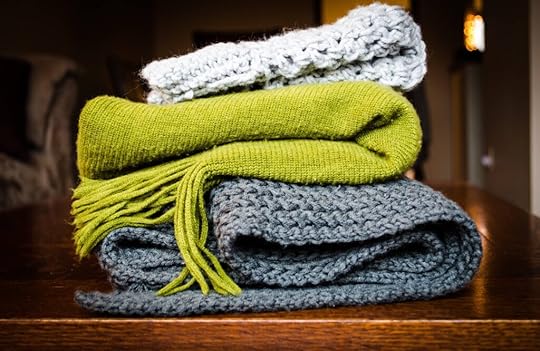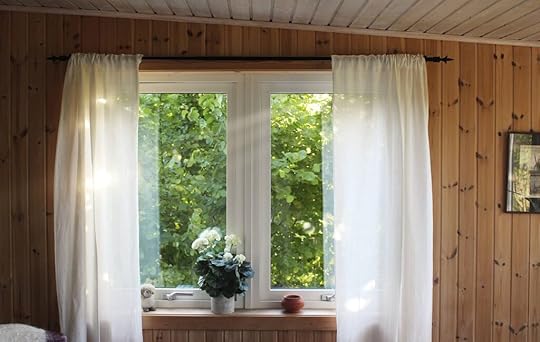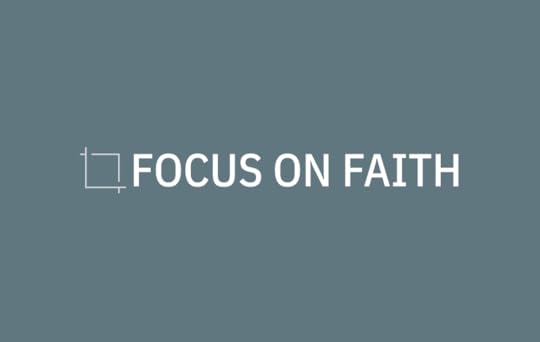Joshua Becker's Blog, page 25
April 17, 2023
A Better Path to Contentment

People look for contentment in any number of places.
Some look for contentment in a high-paying job, yet show their discontent the first time they are passed over for a raise.
Some look for it in a large home, yet show their discontent by requiring countless improvements.
Many have sought contentment in a department store, believing that one more item will finally match their desire, but they are always disappointed, despite the promises made in ads.
In our consumeristic culture, where discontent is promoted and material gratification is encouraged, learning to be content can be difficult.
It is a personal journey we all must travel—and nobody’s journey looks exactly the same as another’s. There is no one-size-fits-all, seven-step program to fully attain contentment in your life. I’m not here to offer one.
I do, however, want to raise a question that I think can be helpful to all of us in our pursuit.
What if we have been looking for contentment in all the wrong places?
What if contentment is actually found in the exact opposite of the place where we have been told to look?
That is, what if contentment is not found in accumulating more for ourselves but in giving more to others?
That would change everything!
Benefits of GenerosityWe can quickly picture how contentment would lead to generosity—the less we need, the more we can give away. That’s the way most of us think about it.
But could it be that the inverse is also true? That the more we give, the less we need?
And that generosity is the quickest pathway to contentment?
Consider for just a moment why this might be the case:
Generous people appreciate what they have.
People who give away some possessions hold their remaining possessions in higher esteem. People who volunteer some of their time make better use of their time remaining. And people who donate money are less wasteful with the money left over.
They understand the full potential of their resources—and tend to value them more highly because of it.
Generous people live happier, more fulfilled lives.
Studies have shown that generous people are happier, healthier, and more satisfied with life. And once they find this satisfaction through generosity, they are less inclined to search for it elsewhere.
Generous people find meaning outside their possessions.
It is common for us to wrap up self-worth in net worth, as if a person’s true value could ever be tallied on a balance sheet.
Generous people, on the other hand, find their value in helping others and quickly realize that their bank account balance says nothing about their true value.
Generous people have more fulfilling relationships.
People always prefer the company of a generous giver to the company of a selfish hoarder. People are naturally attracted toward others who have an open heart to share. And a good friend is the best gift you could ever give yourself.
In addition to benefits for the giver, generosity also benefits the receiver. Giving improves lives. It fights to overturn injustice. It solves problems. It offers an example to the world of a better way to live. And it spurs others to do the same.
But there is another benefit of generosity that should not be overlooked.
Maybe the greatest benefit of generosity is the realization that we already have enough.
Enough Is EnoughOur society is held hostage by the pursuit of more. No matter how much we have, we always seem to need more—more stuff and more money.
We choose our careers for the sake of securing more. We spend the best hours of our day trying to obtain more. We get jealous when “less deserving” people seem to have more. And we constantly worry about having enough.
But those who always desire more will never attain it.
Even worse, this desire for more is having damaging effects on our society. Take money for example.
A U.S. poll reported that 85% of people feel stressed about money. Now, there are some who experience this anxiety because of legitimate financial need, but for most of us, this stress is misplaced.
In a world where 62% of the population lives off $10 or less a day, most of our financial-related stress occurs because of artificially manufactured need.
Generosity changes our perspective and helps to remove this pursuit. It reveals to us how blessed we already are. It reminds us we already own more than we need. It shows us how much we have to give and how much good we can accomplish. It helps us see the needs of those we live alongside. And it offers a better alternative for our money than spending it on ourselves.
Generosity counters materialism and consumerism at every point in our lives. It wars against greed and selfish pursuits. It argues against the unquenchable need for more.
Giving aligns our life with higher purposes and offers a better way to live. It reminds us we already have enough. And it provides a fertile soil in our heart for contentment to grow.
This contentment leads to even more generosity, which leads to even greater contentment, which leads to… See where I’m going with this?
Do you desire more contentment in your life? If so, try something new. Give something away. And open up the door for contentment and generosity to collide.
As you give more things away—your money, your time, your energy—your life will feel lighter. Your heart will feel warmer. The world will be better.
And you’ll find contentment sooner than you think.
April 14, 2023
23 Things to Declutter in 2023

I often use the words minimalism and decluttering interchangeably. They are different, of course, but still connected.
Decluttering focuses on removing surface level possessions. Minimalism helps us discover how little we actually need.
Minimalism is better in my opinion, but almost no one can move toward owning less without some decluttering along the way.
Regardless of what you want to call it or how much progress you want to make, if you are ready to put in some effort decluttering unnecessary possessions from your home, you’ll love the change.
Here are 23 things you can delcutter from your home:1. Unused or old power cords and chargers
2. Extra hangers that are taking up space
3. Shoes that are worn out or no longer used
4. Old towels and linens
5. Games/Puzzles with missing pieces
6. Old and expired medications
7. Magazines and newspapers that have been read
8. Expired food from fridge or pantry
9. CDs and DVDs
10. Books that you’ve already read and are unlikely to read again
11. Old and expired makeup
12. Broken or outdated jewelry
13. Duplicates of household items, such as scissors or pens
14. Unnecessary paperwork, such as old bills or receipts
15. Outdated, obsolete, or broken electronics
16. Old and worn out pillows, sheets, and towels in your linen closet
17. Cleaning products you no longer use
18. Unused sporting or exercise equipment
19. Old candles that haven’t been used in years
20. Unused pet toys
21. Take-out sauce packets, napkins, and menus
22. Outdated decor items no longer displayed in your home
23. Almost everything in your junk drawer
Decluttering your home can be a daunting task, but it’s also an incredibly liberating experience.
One step at a time, one item at a time from the list above, and you’ll love the change you see in your home.
April 13, 2023
The Art of Energizing Yourself
Editor’s Note: This is a guest post from Barefoot Minimalists.

Energy is one of the most important aspects of our lives, and it can come from many different sources. When you feel tired or sluggish, you may attribute that to lack of sleep, improper nutrition or maybe a cup of coffee you had that wasn’t nearly strong enough. It’s easy to think that if you aren’t feeling energized, you need to alter your physical state. But there is a whole other world of energy that can be harnessed solely from inspiration and true joy.
Think back to the last time you had a crush and how just a text from them would give you an insane amount of energy. That’s the kind of energy we’re talking about here. The art of energizing yourself is about tapping into this source of energy and learning how to harness it to improve your life.
Energy Givers vs Energy Takers
At one point or another, you may have had a friend who left you feeling like you’ve just run a marathon after spending time with them. Or maybe you have certain tasks that you avoid like the plague because they drain you of your energy.
This is where the concept of energy givers and energy takers comes in. Energy givers are the people, activities, and experiences that leave you feeling energized, fulfilled, and excited about life. This could be spending time with loved ones or trying out a new hobby.
On the other hand, energy takers are the people, activities, and experiences that leave you feeling exhausted, depleted, and drained. These are overly negative or demanding people, tasks that you dread doing, or even environments that make you feel uncomfortable or anxious.
It’s impossible to completely eliminate the energy takers in your life, and we don’t always have time for our energy givers either. The key to energizing yourself is simply to identify your givers and takers and find a balance between the two.
Finding Your Energy Givers
We all have things in our lives that energize us, whether it’s a hobby, a person, or simply some alone time to recharge.
When you prioritize and hold space for your energy givers, you’re essentially investing in yourself. By honoring the things that make you happy, you’re increasing your resilience to stress and negativity. It’s like putting money into a savings account—the more you invest, the more you’ll have to draw on in times of need.
Examples of energy givers can vary widely depending on the person.
Below are some of mine.
Moving my body. Spending time in nature. Watching the sunrise. Having a deep conversation. Making meaningful connections. Laughing so hard it hurts. Taking a cold water dip. Decluttering my space. Honoring my routines. Being in a creative flow state.Make a list of your energy givers. Then make sure to carve out time for them in your schedule, even if it means saying no to other things.
Overcoming Energy Takers
Energy takers can manifest in many ways, from the negative Nancy at work to the never—ending pile of laundry that seems to multiply faster than rabbits.
Unfortunately, you don’t always have the power to change the things and people in your life. Unless negative Nancy quits, you’ll have to interact with her. And if you want to wear clean clothes, you’ll always have laundry that needs to be done. What you do have control over are the boundaries you set for yourself.
You can set boundaries with negative people to limit your interactions with them. If the negative person in your life is a coworker, ask your supervisor if they can put you on different projects or schedules when possible. Alternatively, if they start a conversation that you know will drain your energy, simply walk away. Remember that you are under no obligation to entertain someone else’s negative thoughts.
When it comes to overwhelming tasks, breaking them down into smaller, manageable chunks can make them less daunting. Instead of letting that pile of laundry build up, run a load every couple days.
Below are some examples of my energy takers.
Negative People.Excess clutter. Mindless scrolling on social media. Overcommitment (planning too many things in a short amount of time).Toxic relationships. People pleasing. Unrealistic goals. Unclear boundaries.Now, write a list of your energy takers and think about what changes you can make to lessen their effect on your life.
In Conclusion
It’s easy to get caught up in the idea that energy only comes from physical factors, like sleep and food, but that’s simply not the case. By prioritizing the things that bring you joy and inspiration, you can tap into a whole other world of energy.
So next time you’re feeling sluggish, instead of reaching for another cup of coffee, think about what may be zapping you of your energy. Did you just interact with a negative person? Maybe you spent most of your day scrolling on social media? Whatever it was, focus on removing it from your life and replacing it with something that gives you energy.
Remember, energizing yourself is not just about what you put into your body, but also what you feed your mind and soul.
***
Barefoot Minimalists is a space to celebrate the joys of living a simple and minimal life. Their goal is to make the minimalist lifestyle approachable and to help you live with less while being content with what you have. You can follow them on instagram here.
April 10, 2023
Ten Scientific Studies that Will Encourage You to Own Less

In a world that measures success in material possessions, owning less is countercultural.
But through the years, I have found motivation to own less in the many studies that support the decision.
Though culture and marketers encourage us to buy more, those who study the impact of excess possessions on life encourage us to own less.
If you ever find yourself needing a little bit of extra motivation to own less and embrace a more minimalist lifestyle, I encourage you to come back to this article. Bookmark it if you need to.
No matter who you are, you’ll find something here to encourage you.
Ten Scientific Studies that will Encourage You to Own Less1. Owning Fewer Possessions Reduces Stress
Clutter makes us feel stressed. When you concentrate, you can actually feel the weight of excess possessions on your shoulders.
Studies confirm the feelings we have. Research confirms that possessions can make us feel stressed, anxious, and depressed. Clutter produces a chemical reaction in our body.
Even more fascinating, according to a study published in 2011, people who value their possessions highly tend to experience higher levels of stress and depression. Not because of their quantity necessarily, but just because of the value they place on them.
Not only can minimalism help clear clutter from our homes, it can also reframe the value we place on physical possessions. Win-win.
2. Owning Fewer Possessions Boosts Well-Being
The modern growth of minimalism as a lifestyle is still relatively new. But according to all of the research and evidence collected thus far, a consistent positive relationship has been found between voluntary simplicity and well-being.
This 2021 paper (Minimalism, Voluntary Simplicity, and Well-Being: A Systematic Review of the Empirical Literature) reviewed 23 empirical studies to reach that conclusion.
3. Owning Fewer Possessions Can Improve Relationships
In 2021, research was published in Frontiers in Psychology by three researchers in China. According to their findings, people who were less materialistic and focused on experiences rather than material possessions had more positive social interactions and stronger social bonds.
Owning less paves the way for stronger relationships with others.
4. Owning Fewer Possessions Helps Us Sleep Better
Sleep researchers have discovered that cluttered bedrooms were associated with poor sleep quality. In a physically cluttered environment, it can take longer to fall asleep and experience restful sleep.
As a result, the study suggested that removing excess possessions from the bedroom can lead to a better night’s rest.
5. Owning Fewer Possessions Boosts Productivity
A study by scientists at the Princeton University Neuroscience Institute found that clutter in the workplace can have a negative impact on productivity.
Participants in the study who worked in a cluttered environment performed worse on tasks that required concentration and problem-solving than those who worked in a clean and organized space.
6. Owning Fewer Possessions Can Help You Save Money
A recent study, released only in March 2023, studied the impact of minimalist practices on consumer happiness and financial well-being and discovered “adopting a minimalist lifestyle saves substantial money.”
According to the study, this happens for three reasons: 1) reduced purchases saves money on items that add no life value; 2) adopting a prudent and thoughtful stance when controlling consumption; and 3) balancing spending according to budget limitations avoids debt burdens.
I’ve been writing about minimalism for 14 years… and I am really excited to see more and more research emerging on the impact of it on individuals and society at-large.
7. Owning Fewer Possessions Can Help Bring Happiness
According to research from the McCombs School of Business at The University of Texas, experiences tend to bring more happiness than material possessions. The researchers concluded that people are happier with experiential purchases over material ones irrespective of when you measure happiness: before, during, or after consumption.
In fact, after studying the data, the researchers said, “If you want to be happier, it might be wise to shift some of your consumption away from material goods and a bit more toward experiences. That would likely lead to greater well-being.”
8. Owning Fewer Possessions Improves Our Physical Health
In a 2016 study titled “Clutter, Chaos, and Overconsumption,” researchers studied the impact of a cluttered environment on habits—in this case, overeating. Participants in the chaotic kitchen condition consumed more cookies and calories than those in a standard kitchen.
An orderly environment, on the other hand, can lead to healthier habits and personal choices—including increased physical exercise.
9. Owning Fewer Possessions Can Improve Memory
Increased physical possessions around us increases the visual noise in our minds and lives. This visual distraction of clutter increases overload and even reduces our working memory.
10. Owning Fewer Possessions Promotes Better Play for Our Kids
A 2017 study from The University of Toledo makes an important observation for us as parents, “when provided with fewer toys in the environment, toddlers engage in longer periods of play with a single toy, allowing better focus to explore and play more creatively.”
This is important for us to realize. Constantly adding more toys is not the best way to help your child grow and develop.
And based on all the studies above, constantly adding new possessions to your home for your own sake is not the best way to grow, develop, and live your most meaningful life.
April 7, 2023
Encouraging Simplicity. Weekend Reads.

Minimalism is the intentional promotion of the things we most value and the removal of anything that distracts us from it. It requires a conscious decision because it is a countercultural lifestyle that stands against the culture of overconsumption that surrounds us.
The world we live in is not friendly to the pursuit of minimalism. Its tendencies and relentless advertising campaigns call us to acquire more, better, faster, and newer. The journey of finding simplicity requires consistent inspiration.
For that reason, I hope you will make an effort this weekend to find a quiet moment with a cup of coffee or tea and enjoy some of these hand-picked articles to encourage more simplicity in your life.
How Minimalism Helped Me in College | The Johns Hopkins Newsletter by Kwan Srijomkwan. Instead of falling into chaos or dragging me back, my personal space can be a springboard where I can create an upward spiral any time things get hard.
Unlocking the Power of Simplicity | The Curiosity Chronicle Newsletter (free to subscribe) by Sahil Bloom. A tidy, simple environment unlocks the mind. You don’t have to be a Marie Kondo aficionado to understand the negative impact that complex, cluttered environments can have on your output.
Embrace a Lifestyle of Slowing Down In a World of Hurry Up | Medium by Michael Horner. The more I practiced the art of slowing down, the more I saw changes in my life that I had always wanted to see.
Self-Care Has Become Sport | No Sidebar by Britt. Self-care has ballooned into a $450 billion industry trying to sell you everything from scented candles to green juice subscriptions to color-coordinated weight sets. All in the name of creating your best self.
At Home: Minimalist Shares Seven Ways to Live with Less | The Gazette by Marni Jameson. In a world of hoarders and minimalists, where do you fall on the continuum, and where would you like to fall?
10 Ways to Sample a Minimalist Capsule Wardrobe (Before You Commit) | Barefoot Minimalists. By streamlining your wardrobe in this way, you can break the seemingly never-ending cycle of buying and purging clothes.
Recently Released Inspiring VideosOur Desires are Being Manipulated | Joshua Becker on YouTube. Why do we buy stuff we don’t need in the first place? While unhealthy motivations may compel us to acquire and consume, we are not entirely to blame.
A “Do it Before You Sit Down” Approach to Getting Stuff Done | Joshua Becker on YouTube. Most often, once I sit down in a comfy chair, I lose all the day’s momentum and motivation. Adopting a “do it before you even sit down” mentality, on the other hand, captures my remaining energy from the workday.
April 5, 2023
Introducing The Focus on Faith Newsletter

Thank you for being part of the Becoming Minimalist Community.
I’m writing today to let you know about something new I am starting.
It is not directly tied to minimalism, but it comes from me. So this seems like the right place to announce it.
Two years ago, I began publishing faith-based devotionals, once a week, on my personal Facebook profile.
I decided recently email is a better platform to deliver those weekly devotionals. For one, not everyone is on Facebook. And more than that, Facebook controls unilaterally what posts get distributed and what do not. Email provides opportunity to connect directly with those who want to read the articles.
So this weekend (Easter), I am launching The Focus on Faith Newsletter.
Here’s a brief description:
This world is full of distraction—worries, riches, pleasures, just to name a few. Keeping our hearts and minds focused on God requires consistent and intentional action.
The Focus on Faith Newsletter is designed to help you do that.
Every week, I send one email that includes a passage of Scripture to meditate on and a 5 minute Christ-focused devotional—intentionally written to keep our hearts inspired and our minds motivated to live for God.
If you want to receive my weekly, Christian, faith-based devotionals, you can sign up here.
If not, no worries. You will see no change in the content or subject matter here on Becoming Minimalist where it has always been my desire to inspire people to own less and live more—regardless of their faith or nonfaith background.
April 3, 2023
Your Life is Too Valuable to Waste Chasing Possessions

“You only live once, but if you do it right, once is enough.” ― Mae West
There is more joy to be found in pursuing less than we can ever find pursuing more. Deep down, this is a message that we already know to be true.
It’s just that, since the day we were born, we have been told something different. We have been told that possessions equal joy.
Every advertisement that has ever been created sets out to convince us that our lives will improve if we buy whatever they’re selling.
And because we hear that message so many times and from so many places, we subtly begin to believe it. As a result, we spend the best years of our lives working long hours to make good money so that we can go buy nice stuff: houses, cars, fashion, technology, toys.
But when we hear the simple message that there is more joy and fulfillment to be found in owning less, it rings true in our hearts and it resonated in our soul.
We know that possessions don’t equal joy. And we know that our life is too valuable to waste chasing them.
It just helps to be reminded from time to time.
So today, remember:
Our lives are short:
And we only get one shot at living them well. The time goes quick. And once we use it up, we can’t get it back. So make the most of it.
Possessions steal our time and energy. They require unending maintenance to be cleaned, maintained, fixed, replaced, and removed. They steal our precious attention, time, and energy and too often, we don’t even notice it—until it’s too late.
Our lives are unique:
Our look, our personality, our talents, and the people who have influenced our lives have made us special. As a result, our life is exactly like no one else.
And just because everyone around us may be chasing material possessions doesn’t mean we have to as well. We get to choose our symbols of success.
Far more than material success, our hearts desire significance because significance lasts. On the other hand, possessions are temporal. They perish, spoil, and fade. And most of them, by design.
Our lives hold opportunity to inspire:
Let’s make footprints worth following because nobody ever changed the world by following someone else.
People who change the world live differently and inspire others to do the same. Possessions may briefly impress, but they never truly inspire.
Our lives are important:
Our heart and soul makes us valuable. Never sacrifice your important role in this world by settling for possessions that can be purchased with a card of plastic.
Our lives are defined by our relationships:
From our closest family members to the strangers we encounter every day, the relationships we cultivate have a profound impact on our lives.
By shifting our focus (and resources) away from physical possessions and investing them into positive relationships, we can build a strong foundation for both ourselves and others.
Our lives deserve better:
Joy, happiness, and fulfillment are found in the invisible things of life: love, hope, peace, and relationships. And they are not on sale at your local department store. Stop looking for them there.
People who live their lives in pursuit of possessions are never content. They always desire newer, faster, or bigger because material possessions can never satisfy our deepest heart desires. Those who always want more, will never find it.
Be reminded today that your life is too valuable to waste chasing material possessions.
And find more joy by choosing to pursue better, rather than more.
March 30, 2023
7 Pursuits that Provide Meaning to All the Others

Our world tends to focus on external measures of success. I suppose this makes sense, those are the things we see every day.
A quick scan of almost any self-help bookshelf will reveal this tendency to focus on external pursuits.
You’ll see books about making money, saving money, working out, getting healthy, productivity, parenting, happiness, advancing in your career, and personal growth.
All of which are noble pursuits. In fact, I’ve written about many of them myself.
But it seems to me that a focus on external measures of success without an equal or greater focus on our internal development leads to less than the best (or even potentially dangerous) outcomes.
For example:
— Making money, without generosity, can lead to greed.
— Advancing in a career, without selflessness, can lead to isolation.
— Pursuing fitness, without humility, can lead to arrogance.
— Gaining intelligence, without wisdom and discernment, can result in unethical outcomes.
Without a proper internal compass in place, even the best external pursuits can become shallow and empty. Or in extreme circumstances, harmful to ourselves and others.
For that reason, an intentional pursuit of worthwhile internal characteristics must accompany, or even supersede, our external pursuits. And it would be wise for each of us to put into place practices that allow us to grow in them.
Here are 7 Pursuits That Provide Meaning to All the Others1. Love
“Don’t try to change people; just love them.” —Anonymous
To love is to experience an affection for another person—to desire the best for them and wish no ill-will upon them.
It is easy, of course, to love those who already love us. But learning to love those who do not love us first is an even greater pursuit.
When we feel genuine love for others, the end result of our external pursuits begin to change. Personal development is not solely about what I can get from it. Instead, personal development is the means through which I bring about my best for others.
2. Wisdom
“Without wisdom, knowledge is more stupid than ignorance.” —Anonymous
Wisdom is the knowledge of what is true or right coupled with just judgment to action. Or, as I have always understood it, Wisdom is knowing how to apply knowledge.
There are any number of things we can accomplish with advanced intellect. But only when we pursue wisdom, do we discover the best use of the knowledge and experience we have gained in life—the best use for both ourselves and the world around us. That is why wisdom is so important.
3. Selflessness
“Happiness doesn’t come through selfishness but through selflessness. Everything you do comes back around.” —Anonymous
Selflessness is the lack of preoccupation with one’s own interests, advancement, desires, etc., and attentiveness to those of others.
It is important, of course, to care for our own personal and our family’s needs. To be selfless means to care not only for own interests, but also for the interests of others.
Selflessness can, and should be, pursued in every arena of life: family, work, community, even the world at large.
And based on all the studies, it is the one internal pursuit that results in the longest lasting happiness and fulfillment.
4. Patience
“Patience is when you’re supposed to get mad, but you choose to understand.” —Anonymous
Patience defined is this, the bearing of provocation, annoyance, misfortune, or pain, without complaint, loss of temper, irritation, or the like.
How perfect is that definition?
It is so easy to become impatient—especially with those we love the most (including ourselves at times).
But even health experts speak to the importance of practicing patience for both our physical and mental health.
Equally important, patience invites others to join us in the journey of life. Without the pursuit of patience, we will inevitably stand alone. And not because we matured or developed faster than everyone else, but because our arrogance will alienate those around us.
We are all in process and all in need of patience—just in different areas. Embracing patience as an internal pursuit allows us to humble ourselves enough to see what areas we need to work on in ourselves.
5. Honesty
“Honesty is a foundation, and it’s usually a solid foundation. Even if I do get in trouble for what I said, it’s something that I can stand on.” —Anonymous
To be honest is to be one who tells the truth or is able to be trusted and not likely to steal, cheat, or lie.
Without honesty, the foundation to acquire many of our external symbols of success can be built without integrity, values, or character. Without honesty as the bedrock of our lives, we will lie, cheat, or steal to acquire anything and everything we desire.
I suppose this might sound attractive to some. But ill-gotten gains are rarely appreciated. A society built on lying, cheating, and stealing will crumble soon enough—and so will our individual lives.
6. Compassion
“Compassion is at the heart of every little thing we do. It is the dearest quality we possess. Yet all too often it can be cast aside with consequences too tragic to speak of. To lose our compassion, we lose what it is to be human.” —Anonymous
Compassion is the sympathetic pity and concern for the sufferings or misfortunes of others.
The world is filled with injustice. Every person you meet has just emerged from a trial, is in the midst of a trial, or is heading toward one. Nobody escapes life without pain.
In fact, it may be the one reality of life that unites all of us.
Compassion brings meaning to our hurts and passion to our endeavors. When we begin to pursue compassion and concern for others, our work (in every aspect of life) takes on greater meaning—and our desire to do it well expands.
If you want to reach your highest potential in your external pursuits, start with compassion in your heart. Your motivation will never wane.
7. Generosity
“A generous heart, kind speech, and a life of service and compassion are the things that renew humanity.” —Anonymous
To be liberal in your giving is to be generous.
Without generosity in spirit and heart, our gains become entirely self-centered. The natural extension of love, selflessness, compassion, and wisdom is generosity. It is the ultimate barometer of how well we are doing in those other pursuits.
And yet, it is different. Generosity is the exact opposite of hollow insincerity; it is a deliberate action that releases our clenched fists from a tight grip on our money, time, talents, energy, and life. It is, indeed, the ultimate expression of love.
Without it, the joy we find in external pursuits is short-lived.
Our world will continue to focus on externals. It is up to us as individuals to nurture the inward pursuits and values that bring meaning to our lives and endeavors. It may be counter-cultural, but out greatest lives and contribution depend upon it.
March 27, 2023
5 Ways to Be Less Influenced in a World Full of Influencers
Note: This is a guest post from Renee Benes of The Fun Sized Life.

It wasn’t until I was 28 years old that I was hit with the shocking realization that the majority of the items in my wardrobe were purchased under the influence. Not to mention a lot of major life decisions.
What I mean is that I had purchased sweaters that my husband liked, jewelry I saw other people wearing, and bought a big house just like the families in my favorite movies when I was kid!
Thank goodness this was before the internet started to become swarmed with perfectly curated, influencer-heavy Instagram feeds and Tik-Tok videos—otherwise my bank account would never have survived (it barely did as it is).
Now that we live in a world where we are constantly being influenced, what can we do to slow our impulses and stay true to ourselves?
5 Ways to Be Less Influenced in a World of Influencers1. Know Your StyleIf you’re anything like me, one of your biggest temptations when it comes to being influenced is fashion. There is no shortage of people telling us how to dress, what to wear, and what is outdated and must be replaced immediately.
One of the best ways I have found to slow our roll when it comes to being influenced is to first know our own unique style. This can be a daunting code to crack because a lot of us tend to have wardrobes filled with stuff other people like rather than items we choose ourselves.
I used to have a closet filled with sweaters that my husband liked, jewelry that was gaudy but trendy, and shoes that I had seen worn by beautiful women on TV.
If you can totally relate and have been easily swayed into buying wardrobe pieces that were pre-approved by someone else, here are some ways you can begin to find yourself (and your style) in your own closet:
Pull your favorite clothing articles out of your closet. Ask yourself what specifically you like about each item. (Texture, style, length, color)Use this as a guideline the next time you are feeling influenced to buy a new piece of clothing: Does this match my style?I have come to find that taking time to declutter your wardrobe can be one of the best ways to learn a little more not only about your style, but who you are allowing yourself to be influenced by.
2. Know YourselfAside from the fashion factor, we are constantly being fed little messages about what type of person we should be. Every single human we meet these days seems to have a different idea of what success means, how a morning routine should look, and even what to eat in a day.
The constant overflow of outside influence is enough to make your head spin.
I myself have fallen into crippling anxiety over the fear of not doing my makeup correctly (heaven forbid anyone see the natural shade of my skin), getting up at 5am (even if I’m exhausted and don’t have to be awake for hours), and even the size of my booty. Why do we live in a world where so many of us are spending our precious waking hours thinking about how to mold our butt into a trendier shape?
Being influenced by these types of things is nothing new. Yes, it’s trickier than ever to avoid the constant onslaught of people telling you who to be and how to live. But the truth is, we have had plenty of people doing this to us since the day we were born. From parents and grandparents, to teachers and friends, we have taken on an array of messages that are (don’t tell your mom I said this,) total rubbish.
Before you start adapting an 18-step skincare routine, or committing yourself to another year long gym membership, ask yourself these few questions:
Is prioritizing this in my life going to add stress or remove it? Was this something I cared about before someone made me feel like I had to? Have I attempted this before and failed? If so, how could I do it in a way that works for me?As soon as I start to feel that bubbling up of anxiety in my belly telling me I should do something the way someone else does, I pause and ask myself if this thing really matters to me or if I can simply allow someone else to have an experience without feeling the need to adopt it for myself?
3. Know Your PrioritiesWhat about those times when you find something you totally know is in line with who you are, who you want to be, and your personal style? Awesome, great, totally psyched for you.
The next stop to check in is to ask yourself if this new want lines up with your current priorities.
When your friends call you up and work on coaxing you into taking a 3-day vacation, this might meet all your needs for travel, time with friends, and self-care, but if you’ve already committed yourself to a family vacation 4 months from now, it might be a good idea to consult which one is a bigger priority. (Unless of course you can swing both. High five!)
As much as we might love them, our friend group can be one of the sneakiest influences in our lives. And if we’re not careful, we can easily shift ourselves off course in an attempt to fit in and prevent creating waves. If you thought peer pressure ended after high school, think again.
Speaking of vacations, have you ever noticed how tempting it is to spend extra before going on vacation? Even when it’s not necessary. The urge to overspend kicks in hard core especially if you’ve done things like browse Pinterest or scroll the Instagram feeds of people who were recently on vacation.
You might have everything you need to bring on vacation within a 10-foot radius of where you are currently sitting, but it’s awfully tempting to scoop up that cute beach hat you see your favorite influencer wearing. A good thing to remember when this type of temptation creeps up on you is that you aren’t going on vacation to wear a hat. Chances are, you are going for some much-needed rest.
When you take the time to get clear about your priorities, before temptation kicks in, it makes it so much easier to tap into that part of you that remembers what does and doesn’t line up with the person you want to be and the life you want to live.
4. Practice the 3 P’sIf you’re feeling a particular influence toward something you see, especially in the stores or online, practicing the 3 P’s can help slow you down so your logical brain has time to kick in and prevent you from making a decision under the influence.
These three P’s are something I got really good at practicing when it came to learning how to kick my shopping addiction:
Pause, Picture, and Plan
—Pause
We live in a world that moves at the speed of light, and because there is less and less lag time between us and the things we want, pausing is not something most of us are good at doing anymore.
Back in the old days (ya know, like 10 years ago), if we saw an ad for our favorite restaurant, we’d have to pause, consider the journey to get there, and if we could afford to eat out. On top of that we might make a few phone calls or send out a text to see if anyone cared to join.
Nowadays if you want your favorite restaurant’s food, you can have it ordered and set to be delivered to your door in 3 minutes only using your phone, lifting nothing more than a finger.
Pausing is not natural for us anymore, but if you want to make sure you are living an uninfluenced life, it’s crucial to take 60 seconds just to check in with yourself before you commit to what would otherwise be nothing more than a brief temptation brought on by influence.
—Picture
Years ago, I saw a Facebook post from a mother who said her 2 year old was throwing a tantrum in the store because she really wanted a toy. This mom shared her story because what she did next was a major #momwin.
She had her daughter hold the doll up and then she snapped a picture of her daughter and the toy. Her daughter’s tantrum stopped and this mom was able to carry on with her life.
A lot of people might read this and think, “I’m going to try that with my kids!” I, however, read this and thought, “Oh my gosh, I wonder if that would work on me?!” The shopaholic in me was most definitely at the same maturity level as a 2-year-old, so I figured giving it a try wouldn’t hurt.
I put my theory to a test when my husband, Tom, and I took a trip to Nashville.
I saw a cute little knick knack shop that made me instantly think every human I have ever known needed me to buy them a kitschy souvenir. Instead of purchasing, I started taking pictures. If I saw something that reminded me of someone, I sent them the picture, and you know what happened?
I received texts back that said, “lol cute,” or “love it.” This made me realize I was dangerously close to spending $20 on stuff that mustered up the same amount of enthusiasm people feel when their Aunt Rita tells them the same joke for the 8th time at Christmas dinner.
Whether it was potential souvenirs for friends or a flowy skirt for me, taking a picture made it so much easier to walk away. It was as if I had tricked my brain into thinking it actually got the item. It satisfied my inner 2-year-old and now I pass this wisdom onto you.
This can also work for workout routines, cooking tutorials, or craft projects. Save the videos, screenshot the steps, or save ideas to your Pinterest boards. Know that all of these amazing things will be there waiting for you if and when you need them, and let go of the idea that it has to be right now.
—Plan
Lastly, plan. Perhaps you do take the screenshot and give yourself plenty of time to pause but you just can’t kick the urge to scoop up a new item, take the vacation, or try teaching yourself how to cook. That’s cool. Instead of either trying to resist the urge or give in without hesitation, why not consider making a plan?
Maybe this means carving out a portion of your next paycheck to devote to making purchases, gradually adding a daily walk into your schedule, or looking at the ingredients you currently have and deciding to make something simple with what you’ve already got.
Planning can help ease us into new decisions and build excitement for when each big moment finally happens.
5. Quiet the NoiseMore than anything, the best way to become uninfluenced in a world where we are constantly being influenced at, is to simply quiet the noise.
This might mean reducing your time on social media, only watching the re-cap segments of the daily news, or unsubscribing from email newsletters that are always tempting you into something new.
No one said you had to allow yourself to be constantly subjected to the push and pull of this ever-present stream of influence.
I know it’s tough to resist the urge to scroll your phone for a few seconds (or a half hour) in the morning—especially when most of us depend on our phones to wake us up. Instead of starting your day with the loud noise of the outside world, consider finding other slightly more peaceful, productive ways to start your day instead of mindless scrolling.
If you feel your anxiety spiking and can’t seem to shake the feeling that you’re always a step behind everyone else, then I highly recommend you stop focusing on what everyone else is doing.
Carve out some time in your day to do your favorite things. Read a book, watch your favorite sitcom, take a bubble bath, and challenge yourself to be comfortable with any quiet that might accompany you.
The world can get pretty noisy, so make time to reconnect to your inner peace.
***
Renee is a self-proclaimed shopaholic turned minimalist and mom in a blended family of 6. She runs a minimalist-centered blog called The Fun Sized Life, hosts the Unstuffed podcast that inspires people to pursue a life that is bigger than stuff, and has 500K followers on social media as a #nostuffinfluencer.
March 25, 2023
Inspiring Simplicity. Weekend Reads.

My desire with each Weekend Reads is to provide you with articles and posts that encourage simplicity and minimalist living. Below, you will find links to blog posts and news stories that I hand-picked over the last couple weeks. I hope you find inspiration and practical help inside them.
That is my goal on Becoming Minimalist: to intentionally promote simplicity in a world that needs to hear it.
Time for a Spring Fling | My Sun Day News by Carol Pavlik. My closet is literally stuffed full with clothing, but most mornings, I can’t find any clothes to wear.
How I Practise Minimalism in India | Pure & Eco India by Upasna Sethi. The author is the host of India’s first minimalist podcast, Comeback Minimalist.
7 Reasons to Declutter Your Home (& How it Will Improve Your Well-being) | A Lovely Year. The way we feel about our living space has a big impact on our state of mind, so I guess it’s no big surprise that when our home feels cluttered and chaotic we feel the same.
Get Back on the Minimalist Bandwagon | No Sidebar by Barefoot Minimalists. The most important thing to remember when you feel like you’ve lost sight of your minimalist goals is to regain control. Don’t let one slip up snowball into dozens of meaningless purchases.
20 Ways I’ve Simplified My Life | Simply Fiercely by Jennifer Burger. Whether you’re interested in minimalism or not, you can still enjoy the benefits of a simpler life.
Recently Released Inspiring VideosHow The Convenience Fallacy Contributes to Clutter in Our Home | YouTube by Joshua Becker. By leaving things out in the open, we think we’re saving time when we need them, but the result is a huge source of the visual clutter in our homes.
10 Simple Steps to Make the Most of Every Day | YouTube by Joshua Becker. Today is among the greatest gifts we have ever been given. Let’s use it wisely.



